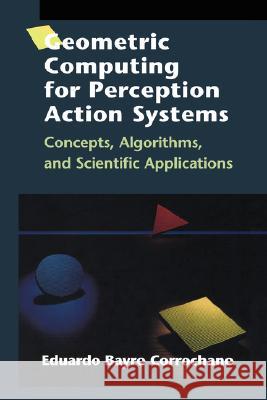Geometric Computing for Perception Action Systems: Concepts, Algorithms, and Scientific Applications » książka
Geometric Computing for Perception Action Systems: Concepts, Algorithms, and Scientific Applications
ISBN-13: 9780387951911 / Angielski / Twarda / 2001 / 235 str.
Geometric Computing for Perception Action Systems: Concepts, Algorithms, and Scientific Applications
ISBN-13: 9780387951911 / Angielski / Twarda / 2001 / 235 str.
(netto: 184,84 VAT: 5%)
Najniższa cena z 30 dni: 192,74 zł
ok. 20 dni roboczych.
Darmowa dostawa!
This book presents a unified mathematical treatment of diverse problems in the fields of cognitive systems using Clifford, or geometric, algebra. Geometric algebra provides a rich general mathematical framework for the development of the ideas of multilinear algebra, projective and affine geometry, calculus on manifolds, the representation of Lie groups and Lie algebras, and many other areas of applications. By treating a wide spectrum of problems in a common geometric language, the book offers both new insights and new solutions that should be useful to scientists and engineers working in different but related areas of artificial intelligence. It looks at building intelligence systems through the construction of Perception Action Cycles; critical to this concept is incorporating representation and learning in a flexible geometric system. Each chapter is written in accessible terms accompanied by numerous examples and figures that clarify the application of geometric algebra to problems in geometric computing, image processing, computer vision, robotics, neural computing and engineering. Topics and features: *Introduces a nonspecialist to Clifford, or geometric, algebra and it shows applications in artificial intelligence *Thorough discussion of several tasks of signal and image processing, computer vision, robotics, neurocomputing and engineering using the geometric algebra framework *Features the computing frameworks of the linear model n-dimensional affine plane and the nonlinear model of Euclidean space known as the horosphere, and addresses the relationship of these models to conformal, affine and projective geometries *Applications of geometric algebra to other related areas: aeronautics, mechatronics, graphics engineering, and speech processing *Exercises and hints for the development of future computer software packages for extensive calculations in geometric algebra The book is an essential resource for computer scientists, AI researchers, and electrical engineers and includes computer programs to clarify and demonstrate the importance of geometric computing for cognitive systems and artificial autonomous systems research.











